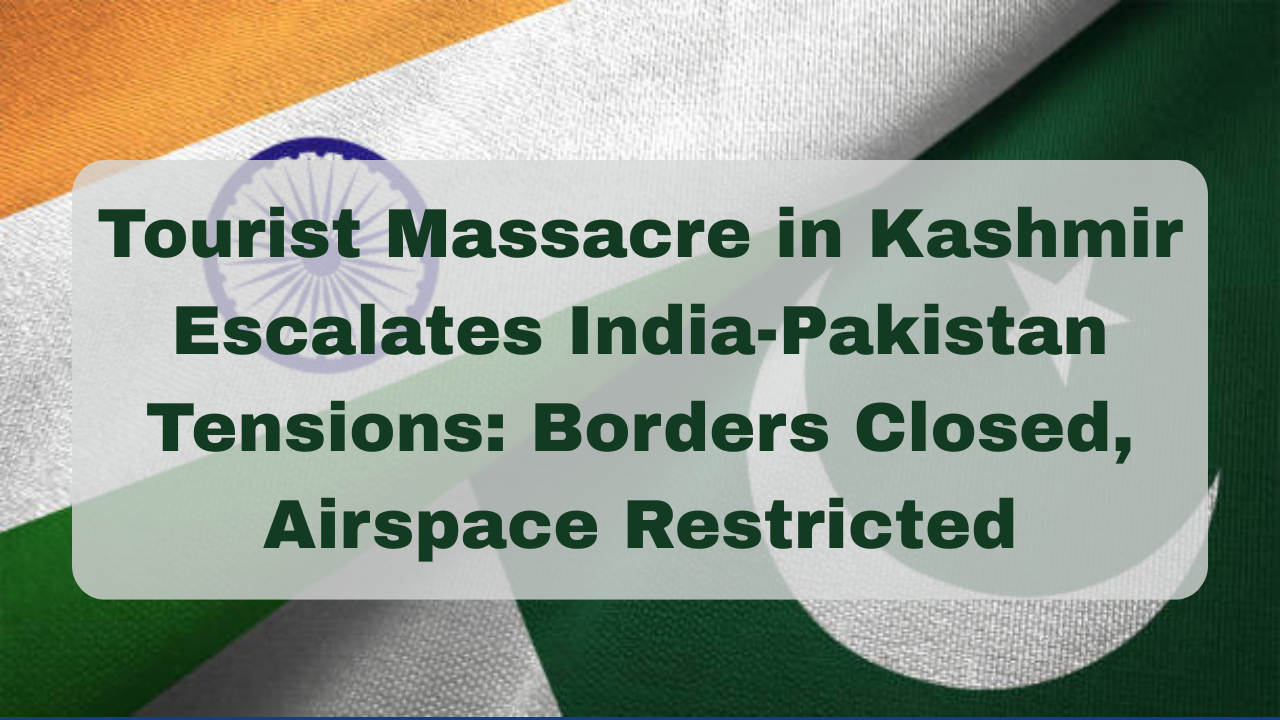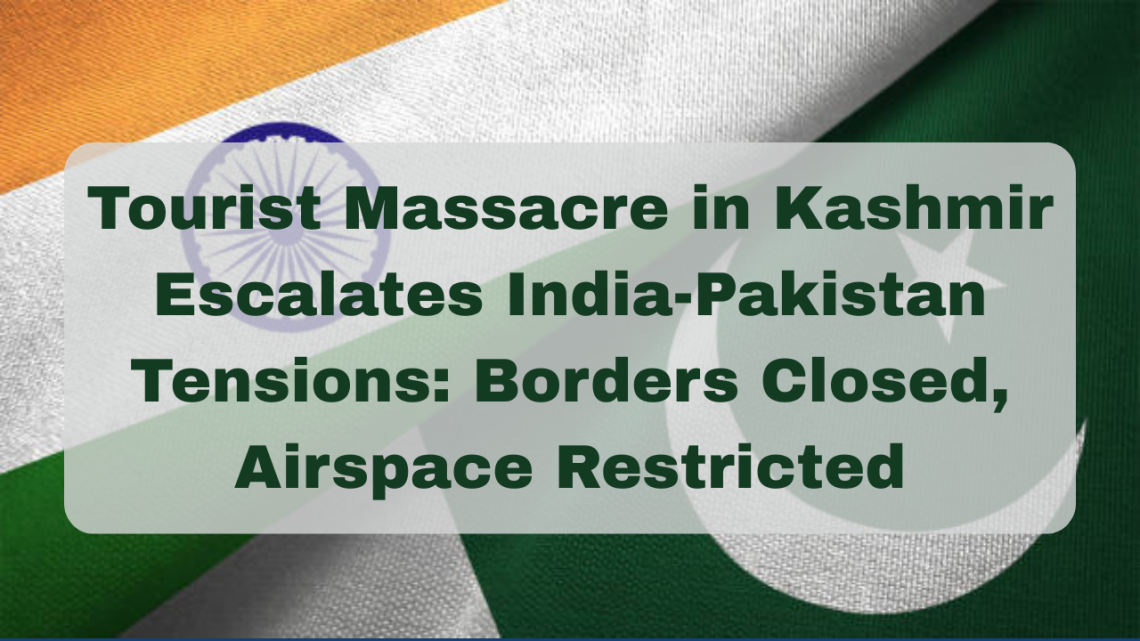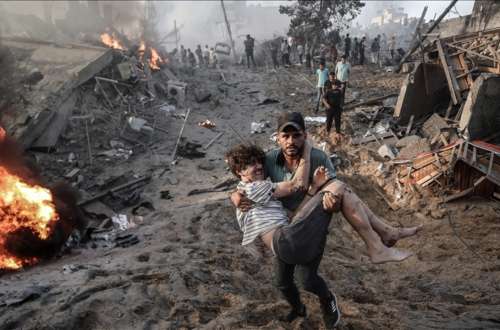
Tensions between India-Pakistan escalate after a deadly tourist attack in Kashmir, leading to border closures, airspace restrictions, and warnings over the Indus Waters Treaty. Stay updated on the latest developments and diplomatic responses from India-Pakistan in this unfolding crisis.
In the wake of a tragic tourist massacre in Kashmir, diplomatic relations between India-Pakistan have plunged to a dangerous low.
The recent attack in Pahalgam, which resulted in the deaths of innocent tourists, has set off a chain reaction of blame, retaliation, and escalating tensions across the subcontinent.
India was quick to point the finger at Pakistan, alleging involvement without offering concrete evidence. Pakistan, on the other hand, has strongly denied any connection to the incident and urged restraint from both sides. However, as events unfold, both nations are taking drastic steps, signaling a deepening crisis.
In this article, we’ll break down everything you need to know about the current situation, including border closures, airspace restrictions, and potential risks surrounding the historic Indus Waters Treaty.
What Happened Between India, Pakistan, and Kashmir ?
Unidentified gunmen attacked a group of tourists in Pahalgam, a picturesque town in Indian-administered Kashmir. The brutal assault left [number] tourists dead and several others critically injured. The incident, one of the deadliest targeting civilians in recent years, has sent shockwaves through the region.
India immediately accused Pakistan-based militant groups of orchestrating the attack. However, no group has officially claimed responsibility so far.
Key facts about the attack:
- Location: Pahalgam, Kashmir
- Casualties: tourists dead, injured
- Alleged involvement: India blames Pakistan; Pakistan denies
India’s Reaction: Border Closures and Diplomatic Pressure
In response to the tragedy, India has taken several aggressive diplomatic and strategic steps:
1. Main Border Crossing Closed
India has officially shut down its main border crossing with Pakistan, located at Wagah-Attari.
This closure impacts:
- Cross-border trade
- Passenger movement
- Cultural exchanges
The closure of the border is a strong signal of India’s growing frustration and willingness to exert pressure on Islamabad.
“We cannot continue to engage in dialogue while innocent lives are lost,” an Indian official stated.
2. Diplomatic Isolation Efforts
India is lobbying internationally to isolate Pakistan, urging allies to condemn the attack and suspend bilateral engagements with Islamabad. Meetings with the United Nations and other global forums are scheduled to discuss the situation further.
Pakistan’s Response: Airspace Closed and Water Warnings Issued
Pakistan has firmly rejected India’s accusations and called for an independent investigation into the Pahalgam incident.
In retaliation to India’s actions:
1. Closure of Airspace for Indian Flights
Pakistan has suspended its airspace for Indian airlines.
- All Indian commercial flights have been rerouted.
- Air traffic between the two nations is severely disrupted.
- International airlines operating between India and Europe are also facing delays.
This move mirrors the airspace closures during previous India-Pakistan standoffs, notably after the Pulwama attack in 2019.
2. Warning Over the Indus Waters Treaty
In a bold step, Pakistan has warned India against violating the Indus Waters Treaty of 1960 — a critical water-sharing agreement brokered by the World Bank.
Pakistani officials have accused India of:
- Planning to divert water from rivers flowing into Pakistan.
- Using water resources as a tool of political pressure.
If India takes aggressive steps regarding water flows, it could have catastrophic consequences for Pakistan’s agriculture and economy.
Historical Context: India-Pakistan, Kashmir and the Cycle of Violence
The Kashmir region has been a flashpoint between India-Pakistan since their independence in 1947. Both countries claim the region in full but control parts of it.
This disputed territory has sparked:
- Three full-scale wars
- Numerous military skirmishes
- Decades of insurgency and violence
Civilian massacres, unfortunately, have been part of the tragic history of Kashmir. But tourist attacks are rare and carry major political consequences, as they tarnish India’s image internationally and damage its tourism sector.
International Reaction
The international community is closely watching developments in India-Pakistan, urging both countries to exercise restraint.
United Nations:
- Called for an impartial investigation into the Pahalgam killings.
- Urged both India and Pakistan to avoid unilateral actions that could escalate tensions.
United States and European Union:
- Expressed concern over rising military tensions.
- Advised their citizens to avoid travel to Kashmir and border regions.
China:
- Urged dialogue and diplomatic engagement between New Delhi and Islamabad.
Possible Outcomes: What Could Happen Next?
Given the current trajectory, there are several potential scenarios:
1. Diplomatic Talks (Optimistic)
If cooler heads prevail, backchannel diplomacy could lead to a gradual easing of tensions.
Third-party mediation, possibly by the UN, the UAE, or another neutral country, could facilitate dialogue.
2. Military Escalation (Pessimistic)
Both countries could engage in limited military skirmishes along the Line of Control (LoC).
Past incidents show how quickly such confrontations can spiral out of control, leading to broader conflict.
3. Economic and Water Wars (New Fronts)
If India seriously tampers with river flows, Pakistan may consider it an act of aggression under the Indus Waters Treaty, leading to international arbitration or worse.
What Should Citizens Expect?
With borders closed and airspace restricted, ordinary citizens are already feeling the pinch.
For India-Pakistan:
- Flights between the two countries will be expensive and limited.
- Cross-border trade, which benefits thousands of families, will suffer.
- Tourism, especially in Kashmir, will collapse temporarily.
For expatriates and students abroad from India-Pakistan:
- Consular services may face delays.
- Travel plans should be reviewed with caution.
Conclusion: A Dangerous Moment Demanding Wisdom
These are indeed dangerous times for India-Pakistan. While emotions run high, both India and Pakistan must remember the high cost of conflict:
- Lives lost
- Economies shattered
- Years of development undone
The Pahalgam tragedy is heartbreaking. But blaming without evidence, closing doors of dialogue, and taking unilateral aggressive actions can only bring more suffering.
Both countries owe it to their citizens — and the future generations — to step back, investigate thoroughly, and resolve their differences through diplomacy, not war.
Only restraint, wisdom, and mutual respect can prevent another humanitarian disaster in the subcontinent. For more information, visit here.




